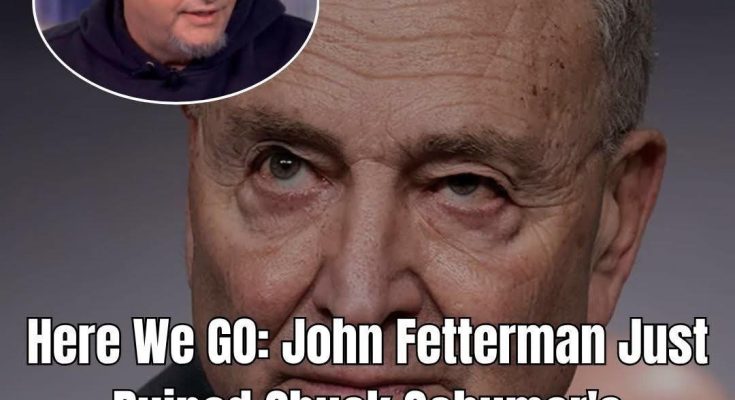The federal government shutdown has entered its fourth week, marking the longest in U.S. history, and tensions on Capitol Hill are mounting as lawmakers search for a way to end the stalemate. Among the growing chorus of frustrated voices is Senator John Fetterman (D-Pa.), who surprised many this week by suggesting that the Senate should consider using the so-called “nuclear option” to suspend the filibuster — at least temporarily — to pass a bill that would reopen the government.
The proposal, which would allow legislation to move forward with a simple majority vote instead of the traditional 60-vote threshold, immediately stirred debate across party lines. It also placed Fetterman once again in the national spotlight as one of the few Democrats willing to publicly challenge his own party’s leadership on procedural norms.
Fetterman’s Call for Action
Speaking to reporters outside the Senate chamber on Monday, Fetterman expressed frustration with the ongoing shutdown, which has left hundreds of thousands of federal workers furloughed or without pay and disrupted food assistance programs across the country.
“There are no winners here,” Fetterman said. “It’s not getting better every day. People are going to start to get really hungry, and I’ve been fully committed to funding SNAP. This is just bad political theater. Open it up.”
Fetterman warned that the Supplemental Nutrition Assistance Program (SNAP) — which provides food assistance to low-income families — is nearing the end of its available funding. He said the situation is particularly urgent in his home state of Pennsylvania, where many families depend on federal nutrition support.
“It’s one of many reasons why I could never vote for shutting our government down,” Fetterman wrote in a recent post on X (formerly Twitter). “Food insecurity is real for many Pennsylvania families.”
What the “Nuclear Option” Would Mean
Fetterman’s proposal centers on the idea of “carving out” the filibuster — a Senate rule that requires 60 votes to advance most legislation. Under current conditions, that rule effectively allows a minority of senators to block government funding measures unless a bipartisan agreement is reached.
When asked whether he would support Republicans’ efforts to eliminate or suspend the filibuster to pass a funding bill, Fetterman was direct:
“Carve it out, absolutely. We ran on that — we ran on killing the filibuster, and now we love it,” he said. “Carve it out so we can move on. I support it because it makes it more difficult to shut the government down in the future, and that’s where it’s entirely appropriate. I don’t want to hear any Democrat clutching their pearls about the filibuster. We all ran on it.”
His comments reflect growing frustration among lawmakers who view procedural gridlock as a major barrier to effective governance. However, they also put him at odds with some within his own party — including Senate Majority Leader Chuck Schumer (D-N.Y.), who has so far resisted calls to alter Senate rules.
Schumer Faces Pressure from All Sides
Senator Schumer is under mounting pressure as the shutdown continues with no clear end in sight. Critics, including some within his own party, argue that leadership has failed to present a viable compromise to reopen the government.
Schumer, however, maintains that any resolution must involve a long-term funding agreement rather than short-term fixes or procedural shortcuts. His office reiterated that eliminating the filibuster could have lasting consequences beyond the current crisis, potentially weakening minority party rights in the Senate for years to come.
“The filibuster has been part of Senate tradition for decades,” Schumer said in an earlier statement. “Any change to it must be considered carefully, because once it’s gone, it’s gone.”
Despite those warnings, the ongoing shutdown has left millions of Americans increasingly anxious about the impact on daily life — and some lawmakers, like Fetterman, argue that the urgency of the moment outweighs procedural tradition.
The Human Impact of the Shutdown
As the shutdown surpasses 20 days, its economic and social consequences are deepening. Federal employees have missed multiple paychecks, small business loan programs have paused, and some national parks have closed their doors to the public.
One of the most immediate concerns is the SNAP program, which provides monthly food benefits to more than 40 million Americans. Without congressional action, the program could soon face funding gaps, leaving families uncertain about how they will afford groceries.
“People are already worried about rent and utilities,” said Linda Chavez, director of a community food pantry in Philadelphia. “If SNAP payments stop, food banks will be overwhelmed within weeks.”
Fetterman has made food insecurity a central issue since taking office, often highlighting stories from working families who rely on the program. His recent comments reflect growing fear that a prolonged shutdown could trigger a broader humanitarian crisis.
A Divided Senate
The Senate’s inability to pass a continuing resolution — a temporary measure that would reopen the government while longer-term negotiations continue — underscores the depth of the current divide.
On Monday, the Senate failed once again to advance a funding bill that had already cleared the House of Representatives. The legislation fell short of the 60 votes needed to break a filibuster, with most Democrats supporting it and Republicans opposing provisions they said failed to address spending reforms and border security.
Analysts say the situation reflects how polarized Congress has become. “Both parties are holding firm to their narratives,” said Dr. Henry Wallace, a political science professor at the University of Pennsylvania. “Democrats are emphasizing social programs and stability, while Republicans are pushing for fiscal restraint and border control. Neither side wants to appear weak, which makes compromise incredibly difficult.”
Fetterman’s Independent Streak
Senator Fetterman’s willingness to challenge his party’s leadership is not new. Since entering the Senate in 2023, he has cultivated a reputation as a plainspoken, independent-minded Democrat. His casual style — often appearing in hoodies and shorts instead of suits — has made him an unconventional but popular figure among working-class voters.
While he remains aligned with his party on most issues, he has occasionally diverged from progressive orthodoxy, particularly on energy policy and criminal justice reform. His latest remarks on the filibuster continue that trend, underscoring his belief that the Senate must be more responsive to public needs during crises.
“John Fetterman speaks in a way that resonates with people outside Washington,” said Dr. Wallace. “He’s direct, sometimes blunt, and that authenticity sets him apart — even if it occasionally frustrates party leaders.”
Looking Ahead
Whether Fetterman’s proposal gains traction remains uncertain. Changing the filibuster rules would require near-unanimous support among Senate Democrats and the approval of the Vice President to break a 50-50 tie. So far, several moderate Democrats have expressed hesitation, citing concerns about precedent and long-term consequences.
For now, the focus remains on finding a path forward that can reopen the government and restore essential services. Negotiations between the White House and congressional leaders are expected to continue this week, though no breakthrough appears imminent.
As the standoff drags on, lawmakers from both parties face growing pressure from constituents to find common ground. “People are tired of finger-pointing,” said Angela Martin, a federal contractor from Pittsburgh. “They just want the government open and their lives back to normal.”
A Broader Debate Over Senate Rules
Fetterman’s comments have reignited a broader debate about whether the Senate’s procedural rules are compatible with modern governance. Supporters of reform argue that the filibuster has evolved from a tool of minority protection into a mechanism for obstruction, while defenders say it remains vital for promoting bipartisan cooperation.
“Moments like this force the Senate to ask whether tradition is helping or hurting democracy,” said Dr. Wallace. “Fetterman’s proposal might not succeed, but it could push the conversation forward in ways that last beyond this shutdown.”

